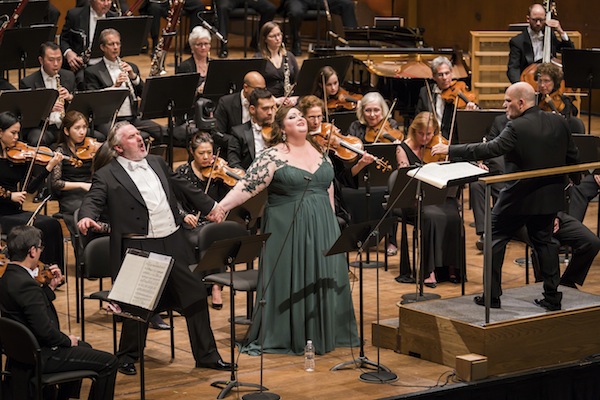Van Zweden, Philharmonic build anticipation with a powerful “Walküre”

Simon O’Neill and Heidi Melton were soloists in Act I of Wagner’s “Die Walküre” with Jaap van Zweden conducting the New York Philharmonic Wednesday night at David Geffen Hall. Photo: Chris Lee
Jaap van Zweden may still be waiting in the wings, but he isn’t staying quiet. After the appointments of a new board chairman, new CEO, and some new section principals, he will be the last piece of the New York Philharmonic’s facelift to settle into place when he formally becomes music director this fall. In the meantime, he continues to build anticipation with full-bore programs that seem to jump off the calendar and grab you by the lapels.
This week’s subscription program looked back to a historic concert in 1876, when the Philharmonic brought Act I of Wagner’s Die Walküre to American audiences for the first time. Having the first performance on Wednesday of this week admittedly struck an odd note: nothing says “Happy Valentine’s Day” like a heroic depiction of fraternal incest.
With such a bold work making up the meat of the program—and with no intermission—John Luther Adams’s ten-minute Dark Waves, getting its New York premiere, felt like a token addition on the front end.
Dark Waves lives up to its name and would have made an interesting pairing for Das Rheingold. A growing mass of sound slowly emerges out of a thick, stifling murk, almost like a camera lens being focused, increasing in intensity as the pulses of the strings become more clearly defined. Distant horn calls give a glimpse of the horizon, and the whole composition builds up to a majestic crest, after which point it becomes wearisome—the same wall of sound, goes out just as it came in.
As for the main event, this Walküre showed just about everything one might hope for from van Zweden’s conducting. The Philharmonic has rarely sounded tighter, more energetic, or more powerful. The winter storm of the prelude came through brilliantly with sharp hairpins and stark dynamic contrast vividly portraying the driving snow, and van Zweden kept the whole composition perfectly balanced, allowing the calls of the horns to shine through the chaos as they recalled Donner’s summoning of the thunderstorm at the end of Das Rheingold.
The strongest of the trio of singers was John Relyea, whose booming, muscular baritone made him a towering Hunding, admittedly a somewhat limited villain role.
Soprano Heidi Melton proved nearly ideal as Sieglinde. She brought a rich voice to the role, showing smooth tenderness through most of the act, but was capable of thrilling energy, as well. She nearly lost control as excitement turned into frenzy in her final duet with Siegmund, allowing a few notes in her upper register to widen.
Tenor Simon O’Neill was more suspect as Siegmund—his top, oddly enough, was the strongest part of his voice, clarifying into a powerful, brassy ring, without any hint of strain or spreading; the high notes in “Winterstürme” were spectacular. In the rest, he lacked the fullness and color to be a convincing mythical hero. His stretched, thin sound, made him sound more like the Nibelung lackey Mime than the Wälsung hero.
But of course this was a Philharmonic concert, and the orchestra earned pride of place in this performance. In Wagner’s ideal, his operas were complete multi-sensory experiences, to which the staging is essential, no more superfluous than text or music. In truth, the scores he left behind are so vivid that a powerful performance from the orchestra can supply nearly all the dramatic element required.
Under van Zweden, the Philharmonic contributed every bit as much storytelling as the singers, defining the pace of the scene with their crisp playing, and foreshadowing and highlighting dramatic themes by subtly emphasis of motivic elements. From the bracing energy of the opening bars through the thickly woven, romantic swelling of the conclusion, this was a performance of the highest caliber. If this is to be the van Zweden standard going forward, the Philharmonic may have found the right man.
The program will be repeated 7:30 p.m. Thursday and 8 p.m. Saturday at David Geffen Hall. nyphil.org







Posted Feb 16, 2018 at 6:06 pm by TPS
Agree completely, orchestra energetic and exciting. Tenor somewhat weak, Hunding outstanding, Sieglinde a bit rough at time but has real potential